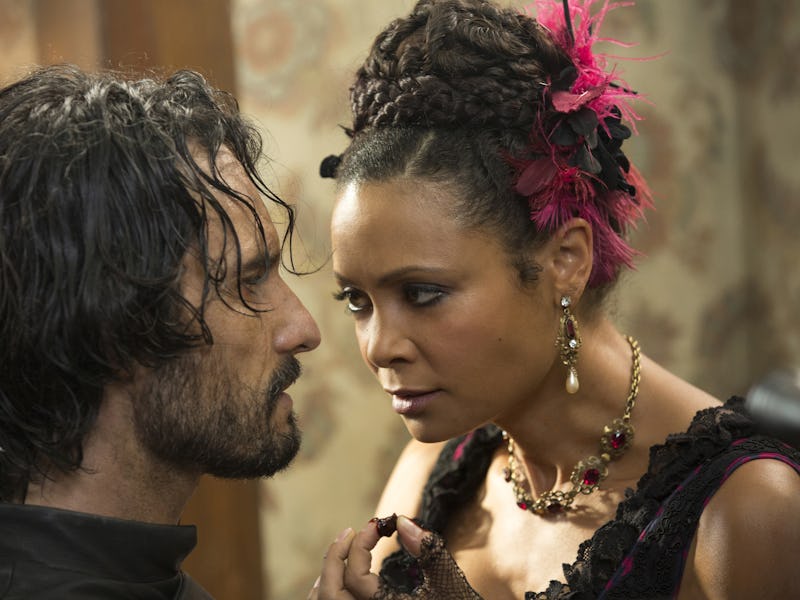'Westworld's Deus ex Machina Suggests Where The Show Will Go
Maeve, Hector, and Ford all talked about gods. Here's what this means for Westworld's storytelling.

The fourth episode of Westworld just pulled a deus ex machina, and that doesn’t mean a hero flew in to rescue our protagonists at the last moment. Rather, in both Theresa and Ford’s unnerving lunchtime conversation and in Maeve and Hector’s tense encounter, the show invoked the ancient Greek concept of the “God in the Machine.” The literary nod compounds Westworld’s already numerous Shakespearean nods, and the logical mechanics of the device give us a hint about where Westworld will go in future episodes.
Today, we know the deus ex machina concept as evidence of bad writing, because it implies an unjustified plot twist. If your protagonist is in a bind and suddenly a person or an event appears in out of nowhere to rescue them, that’s a deus ex machina.
The concept has a negative connotation in storytelling now, but the ancient Greek understanding of the idea was far more literal. Actual gods belonging to the Greek pantheon would often swoop in and resolve the plot. When the story was performed onstage — most notably in Euripides’s plays — this meant a series of ropes would lower the “god” to the stage in a hand-made divine intervention. The concept stuck through the centuries and morphed into slightly less literal forms. Even Shakespeare used it, most notably in The Winter’s Tale, when the statue of a “dead” queen suddenly comes to life.
Theresa and Ford
Since Westworld is highly meta in its storytelling, constantly nodding at the practice of TV writers catering to imagined audiences, we can assume its blatant invocation of the Deus ex Machina is yet another extension of this effort. As they eat lunch, Ford tells Theresa, “Here we were gods and you merely our guests.”
Later in the episode, as Maeve (Thandie Newton) experiences reveries, she remembers her traumatic experience of waking up in the lab with the technicians standing above her in hazmat suit-like attire, which is unfamiliar to a woman who only knows The Wild West.
When she tells the bandit Hector, demanding an explanation, he says, “It’s a blessing from God to see the masters who pull your strings.” Neither characters in ancient Greek drama nor characters in modern stories with unjustified plot turns usually acknowledge the deus ex machina concept this overtly.
The god is in the machine in Westworld, but here, the characters are aware of it. Not only does this carry all manner of intriguing possibility, but it also hints at a later plot development. There have been theories floating around that Westworld is slyly showing us two separate timelines and William is the Man in Black; there are also theories that Bernard is a host. While “Dissonance Theory” offered meat to proponents of both camps, it didn’t quite travel the distance to clarify either. Instead, it promised that a deus ex machina — a sudden and unexpected plot turn — is coming, while simultaneously justifying it. The real maze in Westworld is its layered storytelling.